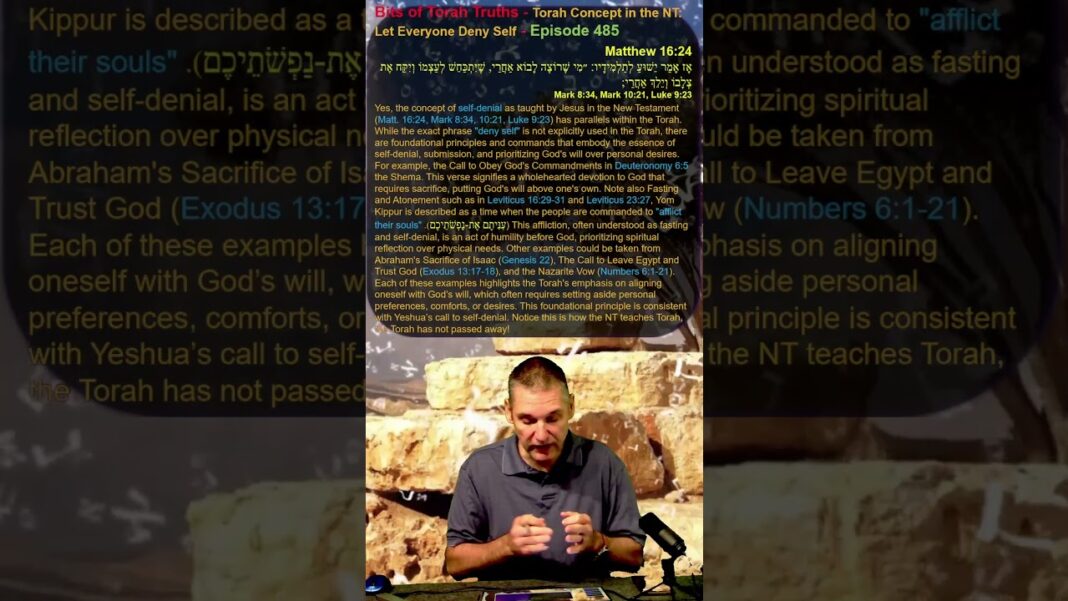Bits of Torah Truths – Torah Concept in the NT: Let Everyone Deny Self – Episode 485
#torah #torahwisdom #torahtruth #torahforlife #torah4you #torahtruth
Matthew 16:24
אָז אָמַר יֵשׁוּעַ לְתַלְמִידָיו׃ ״מִי שֶׁרוֹצֶה לָבוֹא אַחֲרַי, שֶׁיִּתְכַּחֵשׁ לְעַצְמוֹ וְיִקַּח אֶת צְלָבוֹ וְיֵלֵךְ אַחֲרַי;
Mark 8:34
קָרָא אֵלָיו אֶת הֶהָמוֹן עִם תַּלְמִידָיו וְאָמַר לָהֶם׃ ״מִי שֶׁרוֹצֶה לָבוֹא אַחֲרַי, שֶׁיִּתְכַּחֵשׁ לְעַצְמוֹ וְיִקַּח אֶת צְלָבוֹ וְיֵלֵךְ אַחֲרַי;
Mark 10:21
הִבִּיט בּוֹ יֵשׁוּעַ וְרָחַשׁ לוֹ אַהֲבָה. אָמַר אֵלָיו׃ ״דָּבָר אֶחָד חָסֵר לְךָ. לֵךְ מְכֹר מַה שֶּׁיֵשׁ לְךָ וְתֵן לָעֲנִיִּים, וְיִהְיֶה לְךָ אוֹצָר בַּשָּׁמַיִם; אַחַר כָּךְ בּוֹא וְלֵךְ אַחֲרַי.״
Luke 9:23
אָמַר אֶל הַכֹּל׃ ״מִי שֶׁרוֹצֶה לָבוֹא אַחֲרַי, שֶׁיִּתְכַּחֵשׁ לְעַצְמוֹ וְיִשָּׂא אֶת צְלָבוֹ יוֹם יוֹם וְיֵלֵךְ אַחֲרַי;
https://www.matsati.com/index.php/category/bits-of-torah-truths/
Matthew 16:24
16:24 Then Jesus said to His disciples, “If anyone wishes to come after Me, he must deny himself, and take up his cross and follow Me. (NASB)
Mark 8:34
8:34 And He summoned the crowd with His disciples, and said to them, “If anyone wishes to come after Me, he must deny himself, and take up his cross and follow Me. (NASB)
Mark 10:21
10:21 Looking at him, Jesus felt a love for him and said to him, “One thing you lack: go and sell all you possess and give to the poor, and you will have treasure in heaven; and come, follow Me.” (NASB)
Luke 9:23
9:23 And He was saying to them all, “If anyone wishes to come after Me, he must deny himself, and take up his cross daily and follow Me. (NASB)
Yes, the concept of self-denial as taught by Yeshua in the New Testament (Matt. 16:24, Mark 8:34, 10:21, Luke 9:23) has parallels within the Torah. While the exact phrase “deny self” is not explicitly used in the Torah, there are foundational principles and commands that embody the essence of self-denial, submission, and prioritizing God’s will over personal desires. For example, the Call to Obey God’s Commandments in Deuteronomy 6:5 the Shema. This verse signifies a wholehearted devotion to God that requires sacrifice, putting God’s will above one’s own. Note also Fasting and Atonement such as in Leviticus 16:29-31 and Leviticus 23:27, Yom Kippur is described as a time when the people are commanded to “afflict their souls” (עִנִּיתֶם אֶת-נַפְשֹׁתֵיכֶם). This affliction, often understood as fasting and self-denial, is an act of humility before God, prioritizing spiritual reflection over physical needs. Other examples could be taken from Abraham’s Sacrifice of Isaac (Genesis 22), The Call to Leave Egypt and Trust God (Exodus 13:17-18), and the Nazarite Vow (Numbers 6:1-21). Each of these examples highlights the Torah’s emphasis on aligning oneself with God’s will, which often requires setting aside personal preferences, comforts, or desires. This foundational principle is consistent with Yeshua’s call to self-denial. Notice this is how the NT teaches Torah, the Torah has not passed away!









